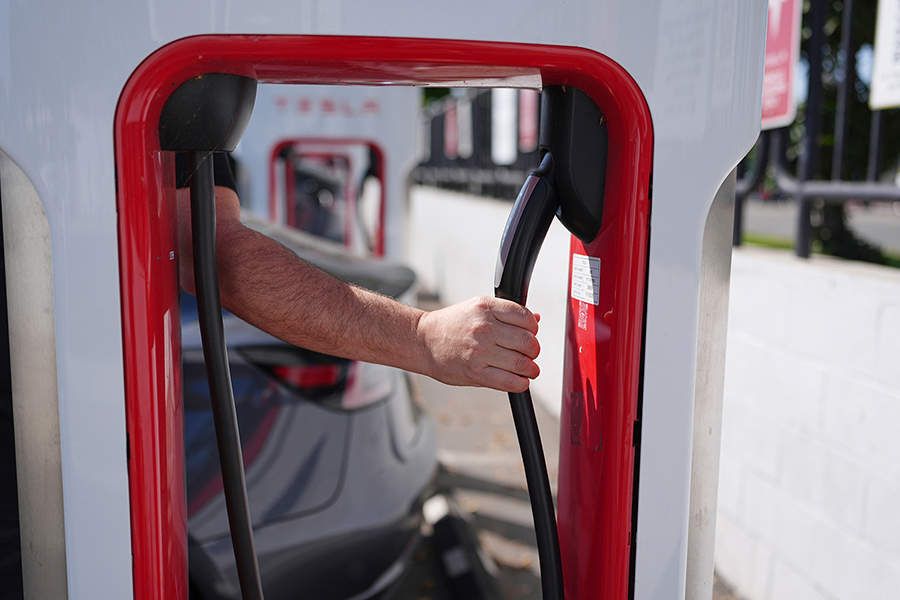Copyright Arizona Capitol Times

Key Points: Arizona agencies push forward with electric vehicle plans despite federal efforts to curtail mandates Arizona Department of Transportation plans to install 74 rapid-charging stations along state highways Arizona agencies estimate $44 million in savings by transitioning to electric vehicles State and local agencies and governments are pushing forward with plans to convert fleet vehicles to electric and install public charging stations despite the federal government’s efforts to curtail electric vehicle mandates and expansion. The Arizona Department of Transportation, along with cities and counties across the state, has either installed or plans to install charging stations on government-owned property and on highways to increase accessibility for electric vehicle owners. Some cities and counties have also replaced aging government fleet vehicles with electric and hybrid vehicles, with plans to acquire more electric vehicles. The agencies and municipalities have developed electric vehicle and infrastructure plans for public electric chargers even as President Donald Trump’s administration ended a tax credit program for new and used electric vehicles. The Trump administration also temporarily paused the National Electric Vehicle Infrastructure program this summer, which provides money to states to install electric vehicle chargers, before resuming it. The Arizona Department of Transportation is receiving $76.5 million from the program to eventually build up to 74 rapid-charging stations along the state’s highways. ADOT recently announced it is seeking bids from private companies to build and operate 34 electric charging stations along Interstates 10 and 40, U.S. Routes 60, 89, 93 and 160, and state routes 64, 68, 80, 87, 90, 95, 260 and 347. The department approved an initial round of charger locations in August 2024, totaling 18 stations along Interstates 8, 10, 17, 19 and 40. All of the stations will be privately owned and operated, with the federal money covering up to 80% of the cost and the private developer paying for at least 20% of the eligible project costs, according to ADOT. Although the state is primed to grow the number of charging stations, the number of drivers who purchased electric vehicles decreased in October after the expiration of the tax credits. According to J.D. Power, electric vehicles accounted for 5.2% of vehicle sales down from almost 13% in September. Despite the drop, there is still an incentive for consumers and governments to purchase electric vehicles due to an overall cost savings, said Diane Brown, executive director of Arizona Public Interest Research Group (Arizona PIRG), which has advocated for local governments to integrate electric vehicles into fleets. “Momentum is on the side of transportation electrification. Arizona has seen businesses start up and employ individuals leading to good jobs, and drivers of EVs have noted financial savings, as well as benefits to air quality and public health,” Brown said. The Arizona PIRG Education Fund, the Nature Conservancy in Arizona and Frontier Group estimate that state agencies can save about $44 million over the next decade by transitioning to electric vehicles. Brown said electric vehicle registrations in the state have increased over the years and several of the state’s largest municipalities have doubled or tripled the total number of electric vehicles in their fleets. The city of Phoenix’s fleet includes 100 electric vehicles across multiple departments and more than 400 charging ports that are open to city employees, fleet vehicles and the public, according to city officials. “While recent federal and state policy changes have created uncertainty for local governments, Phoenix continues to move forward with its clean fleet and infrastructure goals as outlined in the Transportation Electrification Action Plan (TEAP) and Climate Action Plan (CAP),” according to a statement from the city. The city plans to expand to 500 city-owned chargers and 200 electric vehicles in its fleet by 2030, according to the statement. The city was also awarded $15 million through the federal Charging and Fueling Infrastructure Program under the Bipartisan Infrastructure Law to support new charging sites, especially in underserved neighborhoods, but those funds remain on hold pending a federal review, according to the city. “Our commitment to sustainability remains strong regardless of changes at the federal level. Investing in EV infrastructure not only helps improve air quality and public health but also supports long-term economic growth and resilience for Phoenix residents,” said Karen Apple, the electric vehicle program manager for the city of Phoenix. The city of Tucson has 85 electric vehicles with plans to add six more, while Sun Tran, the city’s transit service, has 10 electric buses in service with 10 more planned, according to city officials. Sun Tran also received support from Tucson Electric Power to install 10 electric bus chargers, according to TEP spokesman Joseph Barrios. TEP has also supported the city of Tucson and Pima County through its electrification program, which advises and supports governments and agencies that are looking to transition their fleets to electric vehicles and install charging infrastructure, Barrios said. Pima County currently operates 137 electric vehicles and plans to acquire 65 electric or hybrid vehicles over the next several years, said Pima County Services Director Leonard Boswell in a statement. “For the current fiscal year, the focus will be on procuring hybrid vehicles, which aligns with our long-term strategy and does not alter our existing acquisition plan,” Boswell said.



